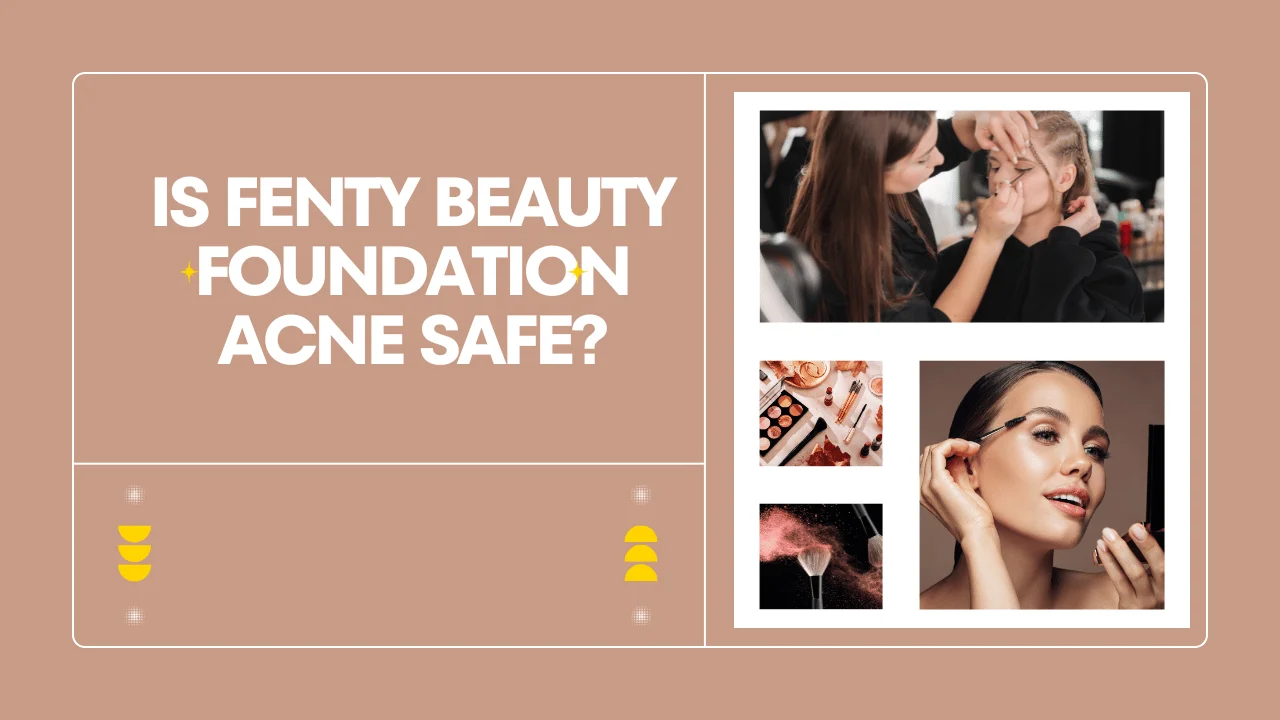You finally found the perfect shade match in Fenty Beauty’s foundation.
The coverage is flawless, your skin looks radiant… but wait, a tiny red bump appears on your cheekbone by lunchtime. Is it a coincidence, or is your dream foundation actually your acne’s worst nightmare?
For many of us with acne-prone skin, the struggle is real. We crave that flawless, airbrushed look, but worry that gorgeous foundation might clog our pores and trigger a breakout brigade.
So, when it comes to Fenty Beauty foundations, the question remains: friend or foe? This blog post dives deep into the acne-friendliness of Fenty Beauty foundations.
We’ll explore the science behind breakouts, analyze the ingredients in Fenty Beauty’s popular formulas, and gather insights from experts and real users – all to help you decide if Fenty Beauty is a safe bet for your acne-prone skin.
Contents
- 1 Understanding Acne and Its Triggers
- 2 Analyzing Fenty Beauty Foundation Ingredients
- 3 Consumer Experiences and Reviews
- 4 Expert Opinions and Dermatological Advice
- 5 The Future of Acne-Friendly Beauty
- 6 Conclusion
- 7 FAQ’s
- 7.0.1 Is Fenty Beauty foundation good for acne-prone skin?
- 7.0.2 What ingredients in Fenty Beauty foundation can cause acne?
- 7.0.3 How can I prevent acne breakouts while using Fenty Beauty foundation?
- 7.0.4 Can I use Fenty Beauty foundation if I have sensitive skin?
- 7.0.5 Should I consult a dermatologist before using Fenty Beauty foundation?
- 7.0.6 Are there any alternatives to Fenty Beauty for acne-prone skin?
Understanding Acne and Its Triggers
Acne is a common skin condition that affects people of all ages. It occurs when hair follicles become clogged with oil and dead skin cells. There are several types of acne, including whiteheads, blackheads, pimples, and cysts. The severity of acne can vary widely, from mild to severe.
Several factors can contribute to acne breakouts. Hormonal changes, particularly during puberty, adolescence, and menstruation, can trigger acne.
Genetics also play a significant role, as some individuals are more prone to acne due to their family history. Diet can also impact acne, with certain foods, such as dairy and sugary foods, potentially exacerbating the condition.
One of the primary causes of acne is the presence of comedogenic ingredients in skincare products. These ingredients can clog pores, leading to the formation of whiteheads, blackheads, and pimples.
It’s crucial to choose skincare products that are non-comedogenic or oil-free to minimize the risk of breakouts.Sources and related content
Analyzing Fenty Beauty Foundation Ingredients
To determine the potential impact of Fenty Beauty foundations on acne-prone skin, it’s essential to analyze their key ingredients.
Fenty Beauty foundations typically contain a blend of silicones, pigments, and emollients. While these ingredients can provide a smooth and flawless finish, they may also contribute to clogged pores in some individuals.
Potential comedogenic ingredients in Fenty Beauty foundations include dimethicone and talc.
These ingredients can sometimes trap oil and debris on the skin, leading to breakouts. However, it’s important to note that individual skin sensitivities vary, and not everyone will experience adverse reactions to these ingredients.
Fenty Beauty has not explicitly claimed that its foundations are entirely non-comedogenic. While the brand emphasizes the use of high-quality ingredients, it’s crucial to consider individual skin types and sensitivities when selecting a foundation.
Consumer Experiences and Reviews

Many consumers have reported positive experiences with Fenty Beauty foundations, praising their coverage, longevity, and skin-like finish.
Some users with acne-prone skin have even shared that these foundations have not caused any breakouts. However, it’s important to remember that individual skin sensitivity plays a significant role in how well a product works for each person.
While Fenty Beauty has a loyal following, there are also instances of negative reviews and reported acne breakouts.
Some users with sensitive skin have experienced irritation or breakouts after using certain Fenty Beauty products. It’s essential to note that these reactions can vary from person to person, and not everyone will experience the same results.
Ultimately, the best way to determine if Fenty Beauty foundations are suitable for your skin is to patch test the product on a small area of skin and monitor for any adverse reactions.
If you have sensitive or acne-prone skin, it’s advisable to consult with a dermatologist to get personalized advice on skincare products.
Expert Opinions and Dermatological Advice
To gain expert insights on the suitability of Fenty Beauty foundations for acne-prone skin, it’s essential to consult with dermatologists.
While individual experiences may vary, dermatologists often emphasize the importance of patch testing new products to assess potential skin reactions. Patch testing involves applying a small amount of the product to a discreet area of skin and monitoring for any signs of irritation or breakouts.
A personalized skincare routine tailored to individual skin needs is crucial for managing acne-prone skin.
This routine should include gentle cleansing, moisturizing, and sun protection. Consulting with a dermatologist can help you develop a customized skincare regimen that addresses your specific concerns.
Proper skincare practices play a vital role in maintaining healthy skin.
Regular cleansing helps remove excess oil, dirt, and makeup, while moisturizing keeps the skin hydrated and prevents dryness. Sun protection is essential to prevent further skin damage and premature aging.
By following a consistent skincare routine, you can help manage acne and improve your overall skin health.
The Future of Acne-Friendly Beauty
The beauty industry is experiencing a significant shift towards clean beauty, with a growing emphasis on non-comedogenic and hypoallergenic products.
Consumers are increasingly seeking products that are free from harsh chemicals and potential irritants. As a result, brands are reformulating their products to meet these evolving needs.
Transparency and accurate ingredient labeling are crucial for consumers with sensitive skin. By understanding the ingredients in their products, individuals can make informed choices that align with their specific skin concerns.
Clear and concise labeling can help consumers identify potential allergens and comedogenic ingredients.
Fenty Beauty, as a leading beauty brand, has the potential to adapt to these changing consumer needs.
By incorporating non-comedogenic ingredients into their formulations and providing transparent information about their products, Fenty Beauty can cater to a wider range of consumers, including those with acne-prone skin.
By staying ahead of the curve and responding to consumer demands, Fenty Beauty can continue to be a successful and influential brand in the beauty industry.
Conclusion
In conclusion, while Fenty Beauty has gained popularity for its inclusive shade range and innovative formulas, the impact of its foundations on acne-prone skin can vary depending on individual skin sensitivity.
While some consumers have reported positive experiences, others have experienced breakouts. It’s crucial to consider the potential comedogenic ingredients in Fenty Beauty foundations and to patch test new products before applying them to a larger area of skin.
Ultimately, the best way to determine if Fenty Beauty foundations are suitable for your skin is to consult with a dermatologist.
They can provide personalized advice and recommend products that are appropriate for your specific skin type and concerns.
By prioritizing individual skin needs, patch testing, and proper skincare practices, you can make informed decisions about your beauty routine and minimize the risk of acne breakouts.
FAQ’s
Is Fenty Beauty foundation good for acne-prone skin?
While Fenty Beauty offers a range of products, it’s important to note that individual skin sensitivities can vary. Some individuals with acne-prone skin may experience breakouts, while others may not. It’s recommended to patch test new products and consult with a dermatologist for personalized advice.
What ingredients in Fenty Beauty foundation can cause acne?
Certain ingredients, such as dimethicone and talc, can potentially clog pores and contribute to acne breakouts. However, the impact of these ingredients can vary depending on individual skin sensitivity.
How can I prevent acne breakouts while using Fenty Beauty foundation?
To minimize the risk of breakouts, it’s essential to maintain a consistent skincare routine, including cleansing, moisturizing, and sun protection. Additionally, consider using non-comedogenic primers and setting powders to help control oil and prevent clogged pores.
Can I use Fenty Beauty foundation if I have sensitive skin?
Individuals with sensitive skin should exercise caution when using new products, including Fenty Beauty foundations. Patch testing is crucial to identify any potential allergic reactions or skin irritations.
Should I consult a dermatologist before using Fenty Beauty foundation?
If you have severe acne or persistent skin concerns, it’s advisable to consult with a dermatologist. They can provide personalized advice on skincare products and treatments that are suitable for your skin type.
Are there any alternatives to Fenty Beauty for acne-prone skin?
Many other beauty brands offer foundations specifically formulated for acne-prone skin. Look for products labeled as non-comedogenic or oil-free. It’s also important to read product labels carefully and avoid ingredients that may trigger breakouts.








